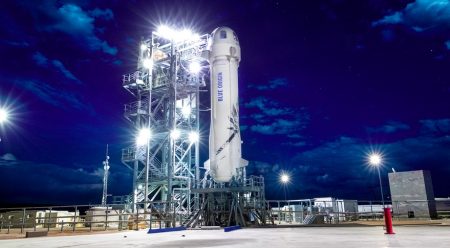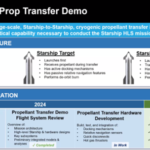July 1, 2018 – It is Canada Day here in the Great White North, the 151st year since the modern country was formed beginning with 4 self-governing North American colonies banding together. There are not many nations on the planet founded by such cooperative and peaceful efforts and it would be nice to think that the nations of the planet could develop similar cooperative relationships based on the same principles that created my home country.
So much for my Canadian editorial. Now on to the business at hand which is all about creating a new carnival attraction for the well-heeled traveler. It is called space tourism and whether it is Richard Branson, Jeff Bezos, or Elon Musk, we are getting very close to moving beyond the selling ticket stage and actually seeing passengers take off on sub-orbital and orbit-to-moon-capable spacecraft over the next couple of years.
Blue Origin
With Blue Origin, the company Jeff Bezos founded, the first test passenger flights are just around the corner according to Senior Vice President, Rob Meyerson. New Shepard, the first generation Blue Origin rocket, and its multi-windowed crew capsule, have been undergoing test flights and landings for a considerable time now. Eight flights so far have gone well so it appears the technology is nearly good to go. What’s left is to determine ticket prices for what would be a sub-orbital ride to the edge of space followed by the capsule separating and descending back by parachute to a ground landing. Likely first passenger flights will happen next year. That means it is time to sell tickets.
Virgin Galactic
Meanwhile, Richard Branson’s Virgin Galactic has successfully completed two test flights of its reconfigured Unity spacecraft, a rocket-powered space airliner that is launched from an airborne mothership named Eve. Branson already has pre-booked over 700 to fly on Unity. Few have backed away from wanting to go even after the 2014 crash of SpaceShipTwo which delayed Branson’s plans by three years. Learning from design flaws and pilot error made on the SpaceShipTwo flight, the company has made significant redesigns to Unity, its successor. Testing both powered and unpowered flight has shown that the new passenger space airliner is very close to being ready for those first paying passengers. Branson hopes that happens before year-end or at the latest early in 2019.
SpaceX
And then there is Elon Musk who recently announced SpaceX’s planned first flight to the Moon and back with two paying passengers aboard is delayed. It will not happen this year and probably not in 2019. The rocket that was to be used is the Falcon Heavy which has successfully flown once so far. Its second flight will be the launch of a satellite for its first paying customer, the U.S. Department of Defense. The launch stages of the Falcon Heavy are designed for reuse making this heavy payload rocket the cheapest to fly in the world.
But Musk has much grander plans than just flying tourists to the Moon and back. Like his competition, Bezos and Branson, he sees the ultimate goal to have millions of humans flying to space and back or living in space or on other Solar System bodies as the century unfolds. And there is a side business which Musk envisions, to use his rockets as a passenger service for sub-orbital travel around planet Earth. In other words, a space airline.
To do this Musk wants to use components of the future BFR launch system, a rocket that he hopes will take the first colonists to Mars. Musk intends to build spaceports in numerous cities around the world, flying passengers between them with his multi-use rockets. How real is this? SpaceX has set up its BFR shop in Los Angeles harbour where all rocket and passenger modules will be researched, manufactured and assembled. There is no timetable as of yet to determine when will be first flight. Musk promises component tests of pieces of the BFR as early as 2019. More realistically based on the slipping of past SpaceX milestones, we likely won’t see a fully completed BFR by the mid-2020s even though Musk believes he can get a first flight to Mars by 2024.
A final word, to all my Canadian readers, a happy Canada Day. And two my American audience, a happy Fourth of July. The rockets that mark these two celebrations, lighting up our evening skies, represent less ambitious efforts than what I have described above, but nonetheless will provide wonderful entertainment for those of us watching. The bigger rocket show is yet to come.
















